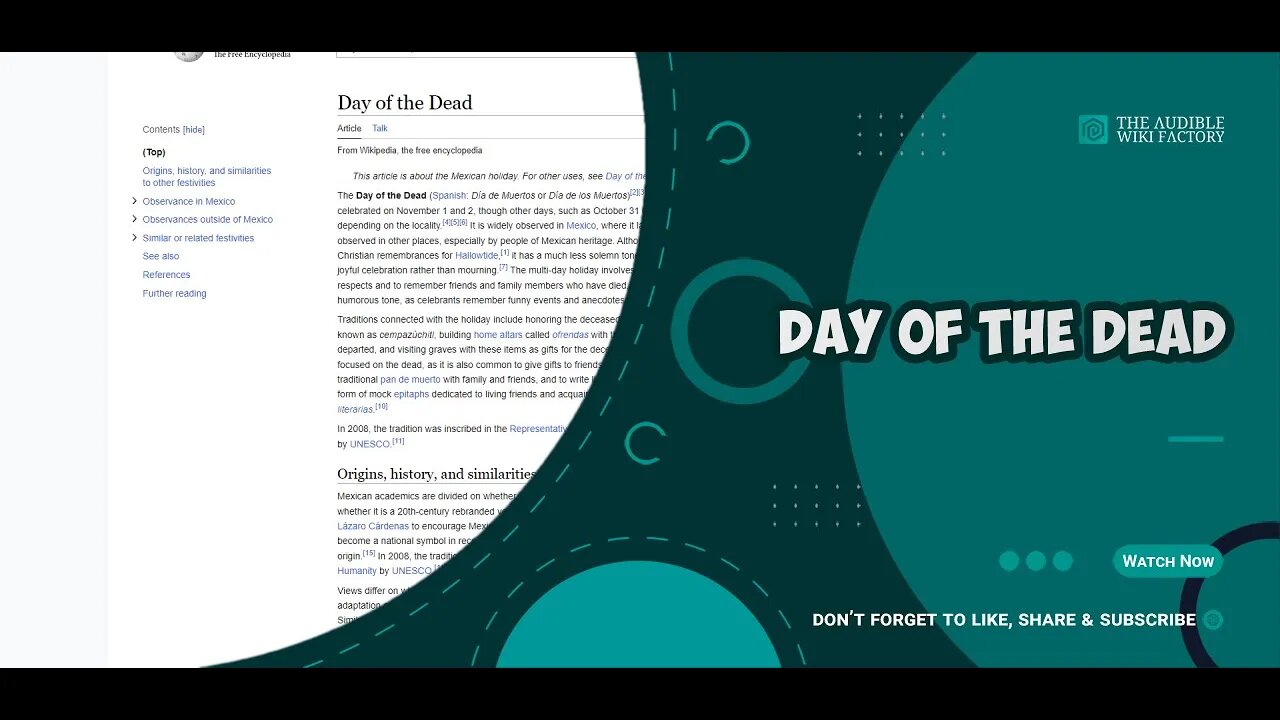Premium Only Content

The Day of the Dead is a holiday traditionally celebrated on November 1 and 2, though other
The Day of the Dead (or as it's known in Spanish: Día de Muertos) is a holiday traditionally celebrated on November 1 and 2, though other days, such as October 31 or November 6, may be included depending on the locality. It is widely observed in Mexico, where it largely developed, and is also observed in other places, especially by people of Mexican heritage. Although related to the simultaneous Christian remembrances for Hallowtide, it has a much less solemn tone and is portrayed as a holiday of joyful celebration rather than mourning. The multi-day holiday involves family and friends gathering to pay respects and to remember friends and family members who have died. These celebrations can take a humorous tone, as celebrants remember funny events and anecdotes about the departed.
Traditions connected with the holiday include honoring the deceased using calaveras and marigold flowers known as cempazúchitl, building home altars called ofrendas with the favorite foods and beverages of the departed, and visiting graves with these items as gifts for the deceased. The celebration is not solely focused on the dead, as it is also common to give gifts to friends such as candy sugar skulls, to share traditional pan de muerto with family and friends, and to write light-hearted and often irreverent verses in the form of mock epitaphs dedicated to living friends and acquaintances, a literary form known as calaveras literarias.
In 2008, the tradition was inscribed in the Representative List of the Intangible Cultural Heritage of Humanity by UNESCO.
ORIGINS, HISTORY, AND SIMILARITIES TO OTHER FESTIVITIES
Mexican academics are divided on whether the festivity has genuine indigenous pre-Hispanic roots or whether it is a 20th-century rebranded version of a Spanish tradition developed during the presidency of Lázaro Cárdenas to encourage Mexican nationalism through an "Aztec" identity. The festivity has become a national symbol in recent decades and it is taught in the nation's school system asserting a native origin. In 2008, the tradition was inscribed in the Representative List of the Intangible Cultural Heritage of Humanity by UNESCO.
Views differ on whether the festivity has indigenous pre-Hispanic roots, whether it is a more modern adaptation of an existing European tradition, or a combination of both as a manifestation of syncretism. Similar traditions can be traced back to Medieval Europe, where celebrations like All Saints' Day and All Souls' Day are observed on the same days in places like Spain and Southern Europe. Critics of the native American origin claim that even though pre-Columbian Mexico had traditions that honored the dead, current depictions of the festivity have more in common with European traditions of Danse macabre and their allegories of life and death personified in the human skeleton to remind us the ephemeral nature of life. Over the past decades, however, Mexican academia has increasingly questioned the validity of this assumption, even going as far as calling it a politically motivated fabrication. Historian Elsa Malvido, researcher for the Mexican INAH and founder of the institute's Taller de Estudios sobre la Muerte, was the first to do so in the context of her wider research into Mexican attitudes to death and disease across the centuries. Malvido completely discards a native or even syncretic origin arguing that the tradition can be fully traced to Medieval Europe. She highlights the existence of similar traditions on the same day, not just in Spain, but in the rest of Catholic Southern Europe and Latin America such as altars for the dead, sweets in the shape of skulls and bread in the shape of bones.
Agustin Sanchez Gonzalez has a similar view in his article published in the INAH's bi-monthly journal...
LINK TO ARTICLE: http://en.wikipedia.org/wiki/Day_of_the_Dead
TAGS: Day of the Dead, Allhallowtide, Festivals in El Salvador, Parades in Mexico, Religious festivals in Mexico, Observances honoring the dead, October observances, Masterpieces of the Oral and Intangible Heritage of Humanity, Mexican folklore, November observances, Latin American folklore, Latin American culture, Mexican-American culture, Mexican culture, Religious holidays, Folk festivals in Mexico, Day of the Dead
#GeneralKnowledge #AudibleWikiFactory #Audible #Wikipedia #DayoftheDead
-
 9:22
9:22
The Audible Wiki Factory
1 year agoThe Albuquerque International Balloon Fiesta is a yearly hot air balloon festival that takes
737 -
 2:51:38
2:51:38
TimcastIRL
8 hours agoGovernment SHUTDOWN IMMINENT, Democrats Vow To BLOCK Trump CR w/The Native Patriot | Timcast IRL
166K93 -
 3:38:57
3:38:57
Digital Social Hour
1 day ago $15.04 earnedAndrew Tate EXPOSES the Truth About Legal Battles, Politics & Masculinity | Andrew Tate DSH #1231
45.5K21 -
 2:26:29
2:26:29
Laura Loomer
8 hours agoEP108: Dems Embrace Domestic Terrorism To "Get Trump"
54.5K18 -
 3:01:51
3:01:51
Right Side Broadcasting Network
11 hours agoWATCH: NASA’s SpaceX Crew-10 Launch
105K42 -
 2:06:17
2:06:17
Glenn Greenwald
10 hours agoJudge Orders Hearing on Columbia Student Deportation Case; Is the Ukraine Ceasefire Plan Serious? Trump Attacks Thomas Massie for His Budget Vote | SYSTEM UPDATE #422
120K166 -
 47:16
47:16
BonginoReport
12 hours agoTrump-Elon Bromance Triggers The Libs (Ep.03) - 03/12/2025
153K280 -
 4:03:41
4:03:41
Barry Cunningham
13 hours agoTRUMP DAILY BRIEFING: PRESIDENT TRUMP PRESS CONFERENCE | DEMOCRATS IN PANIC!
101K97 -
 1:56:30
1:56:30
Melonie Mac
11 hours agoGo Boom Live Ep 40!
57.2K8 -
 1:58:30
1:58:30
Kim Iversen
11 hours agoDOGE, Trump, Aliens and Remote Viewing: A Deep Dive into the Unknown
73K72